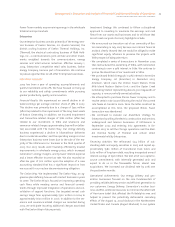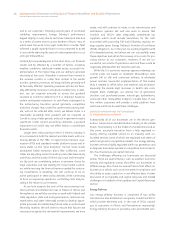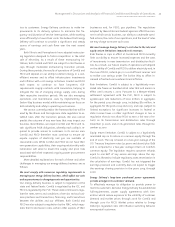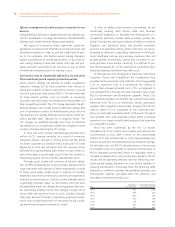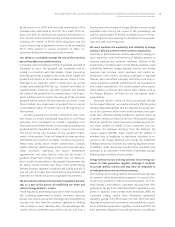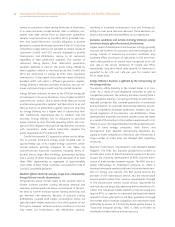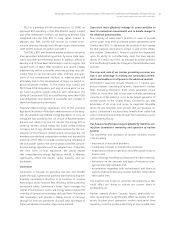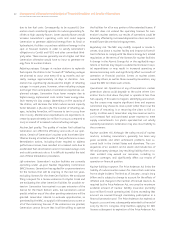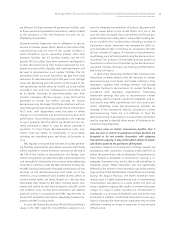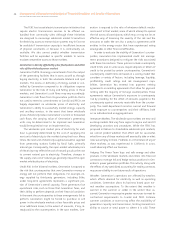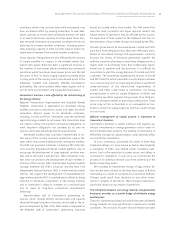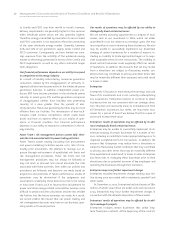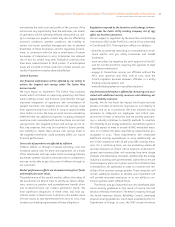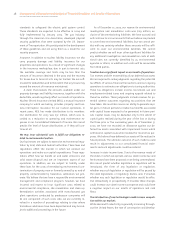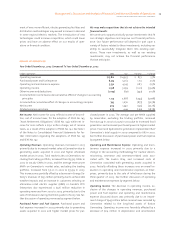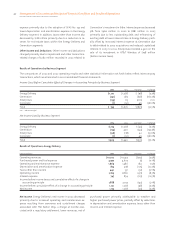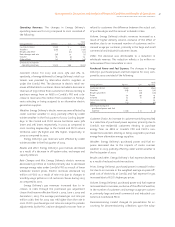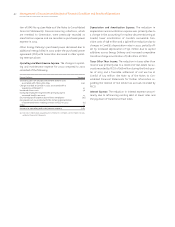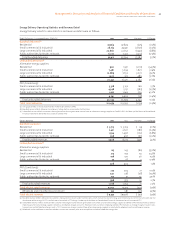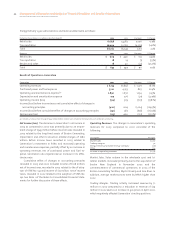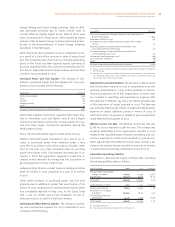ComEd 2003 Annual Report Download - page 37
Download and view the complete annual report
Please find page 37 of the 2003 ComEd annual report below. You can navigate through the pages in the report by either clicking on the pages listed below, or by using the keyword search tool below to find specific information within the annual report.35Management’s Discussion and Analysis of Financial Condition and Results of Operations
EXELON CORPORATION AND SUBSIDIARY COMPANIES
conditions, which may not have been fully anticipated, may
have an adverse effect by causing Generation to seek addi-
tional capacity at a time when wholesale markets are tight
or to seek to sell excess capacity at a time when those mar-
kets are weak. Generation incorporates contingencies into its
planning for extreme weather conditions, including poten-
tially reserving capacity to meet summer loads at levels rep-
resentative of warmer-than-normal weather conditions.
Excess capacity. Energy prices are also affected by the amount
of supply available in a region. In the markets where Gen-
eration sells power, there has been a significant increase in
the number of new power plants commencing commercial
operations which has driven down power prices over the last
few years. In fact, an excess supply situation currently exists
in many parts of the country which has reduced prices in the
wholesale markets and adversely affected Generation’s
profitability. We cannot predict when these regions will re-
turn to more normal levels in the supply-demand balance.
Generation’s business is also affected by the restructuring of
the energy industry.
Regional Transmission Organizations and Standard Market
Platform. Generation is dependent on wholesale energy
markets and open transmission access and rights by which
Generation delivers power to its wholesale customers,
including ComEd and PECO. Generation uses the wholesale
regional energy markets to sell power that Generation does
not need to satisfy its long-term contractual obligations, to
meet long-term obligations not provided by its own re-
sources and to take advantage of price opportunities.
Wholesale markets have only been implemented in cer-
tain areas of the country and each market has unique fea-
tures which may create trading barriers among the markets.
The FERC has proposed initiatives, including FERC Order No.
2000 and the proposed wholesale market platform rule, to
encourage the development of large regional, uniform mar-
kets and to eliminate trade barriers. These initiatives, how-
ever, have not yet led to the development of such markets in
all areas of the country. PJM’s and the New England markets
strongly resemble the FERC’s proposal, and the New York
Independent System Operator (ISO) is implementing market
reforms. We support the development of standardized en-
ergy markets and the FERC’s standardization efforts as being
essential to wholesale competition in the energy industry
and to Generation’s ability to compete on a national basis
and to meet its long-term contractual commitments
efficiently.
Approximately 27% of Generation’s generating re-
sources, which include directly owned assets and capacity
obtained through long-term contracts, are located in the re-
gion encompassed by PJM. If the PJM market is expanded to
the Midwest, 79% of Generation’s generating resources
would be located within that market. The PJM market has
been the most successful and liquid regional market. Our
future results of operations may be affected by the success-
ful expansion of that market to the Midwest and the im-
plementation of any market changes mandated by the FERC.
Provider of Last Resort. As discussed above, ComEd and PECO
each have POLR obligations that they have effectively trans-
ferred to Generation through full-requirements contracts.
Because the choice of electricity generation supplier lies
with the customer, planning to meet these obligations has a
higher level of uncertainty than that traditionally experi-
enced due to weather and the economy. It is difficult for
Generation to plan the energy demand of ComEd and PECO
customers. The uncertainty regarding the amount of ComEd
and PECO load for which Generation must prepare increases
our costs and may limit our sales opportunities. A significant
under-estimation of the electric-load requirements of
ComEd and PECO could result in Generation not having
enough power to cover its supply obligation, in which case
Generation would be required to buy power from third par-
ties or in the spot markets at prevailing market prices. Those
prices may not be as favorable or as manageable as Gen-
eration’s long-term supply expenses and thus could increase
our total costs.
Effective management of capital projects is important to
Generation’s business.
Generation’s business is capital intensive and requires sig-
nificant investments in energy generation and in other in-
ternal infrastructure projects. The inability of Generation to
effectively manage its capital projects could adversely affect
our results from operations.
In 2002, Generation purchased the assets of Sithe New
England Holdings, LLC (now known as Exelon New England),
a subsidiary of Sithe, and related power marketing oper-
ations. Due to the reduction in power prices and delays in
construction completion, in July 2003, we commenced the
process of an orderly transition out of the ownership of the
Boston Generating assets.
We recorded an impairment charge of $945 million be-
fore income taxes related to the long-lived assets of Boston
Generating as a result of our decision to exit these facilities.
Charges could result from decisions to exit other invest-
ments or projects in the future. These charges could have a
significant impact on our results of operations.
The interaction between our energy delivery and generation
businesses provides us a partial hedge of wholesale energy
market prices.
The price of power purchased and sold in the open wholesale
energy markets can vary significantly in response to market
conditions. The amounts of power that Generation provides


